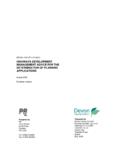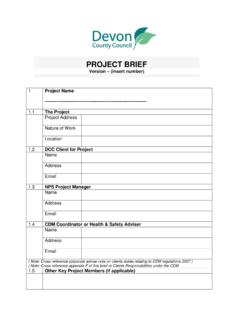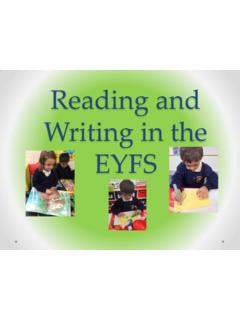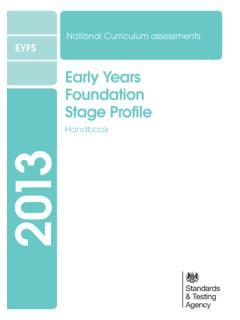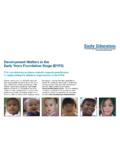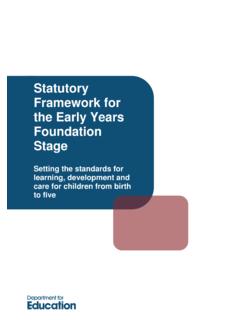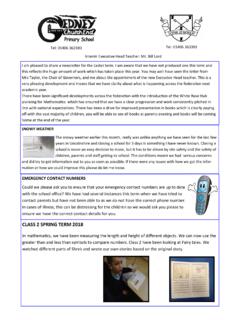Transcription of Section 3 The Safeguarding and Welfare …
1 Ofsted has regard to the Statutory Framework for the early Years Foundation stage ( eyfs ) in carrying out inspections. The Safeguarding and Welfare requirements cover the steps that providers must take to keep children safe and promote their Welfare . Safeguarding and Welfare requirements previously seen as guidance (shoulds). which are now legal requirements (musts) are highlighted below: Section 3 The Safeguarding and Welfare requirements Introduction Children learn best when they are healthy, safe and secure, when their individual needs are met, and when they have positive relationships with the adults caring for them. The Safeguarding and Welfare requirements , specified in this Section , are designed to help providers create high quality settings which are welcoming, safe and stimulating, and where children are able to enjoy learning and grow in confidence. Providers must take all necessary steps to keep children safe and well.
2 The requirements in this Section explain what early years providers must do to: safeguard children; ensure the suitability of adults who have contact with children; promote good health; manage behaviour; and maintain records, policies and procedures. Schools are not required to have separate policies to cover eyfs requirements provided the requirements are already met through an existing policy. Where providers other than childminders are required to have policies and procedures as specified below, these policies and procedures should be recorded in writing. Childminders are not required to have written policies and procedures. However, they must be able to explain their policies and procedures to parents, carers, and others (for example Ofsted inspectors) and ensure any assistants follow them. Child Protection Providers must be alert to any issues for concern in the child's life at home or elsewhere.
3 Providers must have and implement a policy, and procedures, to safeguard children. These should be in line with the guidance and procedures of the relevant Local Safeguarding Children Board (LSCB). The Safeguarding policy and procedures must include an explanation of the action to be taken in the event of an allegation being made against a member of staff, and cover the use of mobile phones and cameras in the setting. A practitioner must be designated to take lead responsibility for Safeguarding children in every setting. Childminders must take the lead responsibility themselves. The lead practitioner is responsible for liaison with local statutory children's services agencies, and with the LSCB. They must provide support, advice and guidance to any other staff on an ongoing basis, and on any specific Safeguarding issue as required. The lead practitioner must attend a child protection training course that enables them to identify, understand and respond appropriately to signs of possible abuse and neglect (as described at paragraph ).
4 Providers must train all staff to understand their Safeguarding policy and procedures, and ensure that all staff have up to date knowledge of Safeguarding issues. Training made available by the provider must enable staff to identify signs of possible abuse and neglect at the earliest opportunity, and to respond in a timely and appropriate way. These may include: significant changes in children's behaviour;. deterioration in children's general well-being;. unexplained bruising, marks or signs of possible abuse or neglect;. children's comments which give cause for concern;. any reasons to suspect neglect or abuse outside the setting, for example in the child's home; and/or inappropriate behaviour displayed by other members of staff, or any other person working with the children. For example, inappropriate sexual comments; excessive one-to-one attention beyond the requirements of their usual role and responsibilities.
5 Or inappropriate sharing of images. Providers must have regard to the Government's statutory guidance Working Together to Safeguard Children'. If providers have concerns about children's safety or Welfare , they must notify agencies with statutory responsibilities without delay. This means the local children's social care services and, in emergencies, the police. Registered providers must inform Ofsted of any allegations of serious harm or abuse by any person living, working, or looking after children at the premises (whether the allegations relate to harm or abuse committed on the premises or elsewhere). Registered providers must also notify Ofsted of the action taken in respect of the allegations. These notifications must be made as soon as is reasonably practicable, but at the latest within 14 days of the allegations being made. A registered provider, who, without reasonable excuse, fails to comply with this requirement, commits an offence.
6 Suitable People Providers must ensure that people looking after children are suitable to fulfil the requirements of their roles. Providers must have effective systems in place to ensure that practitioners, and any other person who is likely to have regular contact with children (including those living or working on the premises), are suitable. Ofsted is responsible for checking the suitability of childminders and of persons living or working on a childminder's premises, including obtaining enhanced criminal records checks and barred list checks. Providers other than childminders must obtain an enhanced criminal records disclosure in respect of every person aged 16 and over who: works directly with children lives on the premises on which the childcare is provided; and/or works on the premises on which the childcare is provided (unless they do not work on the part of the premises where the childcare takes place, or do not work there at times when children are present).
7 Providers must tell staff that they are expected to disclose any convictions, cautions, court orders, reprimands and warnings which may affect their suitability to work with children (whether received before or during their employment at the setting). Providers must not allow people, whose suitability has not been checked, including through a criminal records check, to have unsupervised contact with children being cared for. Providers other than childminders must record information about staff qualifications and the identity checks and vetting processes that have been completed (including the criminal records disclosure, reference number, the date a disclosure was obtained and details of who obtained it). For childminders the relevant information will be kept by Ofsted. Providers must also meet their responsibilities under the Safeguarding Vulnerable Groups Act 2006. Disqualification (all registered providers).
8 In the event of the disqualification of a registered provider, a person living in the same household as the registered provider, or a person employed in that household, the provider must not continue as an early years provider nor be directly concerned in the management of such provision. Where an employer becomes aware of relevant information which may lead to disqualification of an employee, the provider must take appropriate action to ensure the safety of children. In the event of disqualification of a person employed in early year 's provision, the provider must not continue to employ that person. The provider must give Ofsted the following information when relevant: details of any order, determination, conviction, or other ground for disqualification from registration under regulations made under Section 75 of the Childcare Act 2006;. the date of the order, determination or conviction, or the date when the other ground for disqualification arose.
9 The body or court which made the order, determination or conviction, and the sentence (if any) imposed; and a certified copy of the relevant order (in relation to an order or conviction). The information must be provided to Ofsted as soon as reasonably practicable, but at the latest within 14 days of the date the provider became aware of the information or ought reasonably to have become aware of it if they had made reasonable enquiries. Staff taking medication/other substances Practitioners must not be under the influence of alcohol or any other substance which may affect their ability to care for children. If practitioners are taking medication which may affect their ability to care for children, those practitioners should seek medical advice. Providers must ensure that those practitioners only work directly with children if medical advice confirms that the medication is unlikely to impair that staff member's ability to look after children properly.
10 Staff medication on the premises must be securely stored, and out of reach of children, at all times. Staff qualifications, training, support and skills The daily experience of children in early year 's settings and the overall quality of provision depends on all practitioners having appropriate qualifications, training, skills and knowledge and a clear understanding of their roles and responsibilities. Providers must ensure that all staff receive induction training to help them understand their roles and responsibilities. Induction training must include information about emergency evacuation procedures, Safeguarding , child protection, the provider's equality policy, and health and safety issues. Providers must put appropriate arrangements in place for the supervision of staff who have contact with children and families. Effective supervision provides support, coaching and training for the practitioner and promotes the interests of children.



